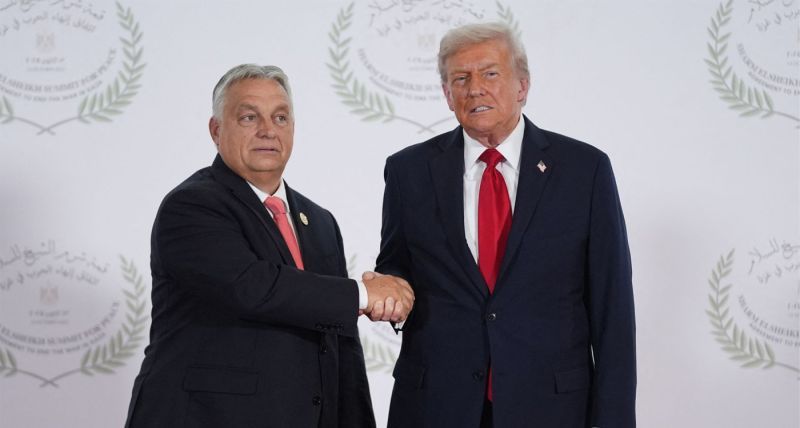- Home
- Middle East
- Why Did Trump Pick Hungary for His Next Summit with Putin?

US President Donald Trump greets Hungarian Prime Minister Viktor Orbán during a summit on Gaza in Sharm al-Sheikh on October 13, 2025. ©Evan Vucci / Pool / AFP
In a move that surprised European capitals and drew sharp criticism from Kyiv, Donald Trump confirmed that his next summit with Vladimir Putin will be held in Budapest, hosted by Hungarian Prime Minister Viktor Orbán. Far from being a neutral choice, this decision reflects a political alignment among three nationalist leaders and highlights growing tensions between Washington and its European allies over how to bring the war in Ukraine to an end.
Orbán: The Trusted Intermediary Between Two Presidents
According to the Kremlin, Budapest was chosen for a simple reason: Hungarian Prime Minister Viktor Orbán maintains “warm” ties with Trump and “constructive” relations with Putin. “This significantly facilitated the agreement reached during the last call between the two leaders,” said Kremlin spokesperson Dmitry Peskov.
Hungary’s position as host is unusual. Despite being a member of both the European Union and NATO, Orbán has criticized Western military support for Ukraine. His claim that “Russia has won the war” has isolated him among European leaders, while bringing him closer to Moscow and aligning him with Trump.
Trump has described Orbán as “a leader we love” and called Hungary “a safe country.” This convergence of nationalist ideologies has positioned Budapest as a “neutral” meeting ground, at least from Trump and Putin’s perspective.
Europe and Kyiv Alarmed by Budapest Summit Plans
The announcement immediately drew reactions across Europe. “Nobody likes this,” a European diplomat told the Financial Times. “We’re pretending everything is fine, but it’s not.”
German Minister for European Affairs Gunther Krichbaum emphasized the necessity of peace talks but stressed that “Ukraine must be at the table.”
Kyiv’s response was even firmer. President Volodymyr Zelensky dismissed Budapest as an unsuitable venue for a peace summit, recalling Orbán’s consistently pro-Russian positions. “I don’t believe a prime minister who blocks Ukraine at every turn can do anything positive for us,” he said.
Zelensky also accused Trump’s special envoy, Steve Witkoff, of proposing Hungary as the host, while pointing to other potentially more neutral alternatives, such as Switzerland, Austria, the Vatican or Qatar.
A Legal and Symbolic Minefield
Hungary’s selection raises not only political questions but also complex legal ones. Putin is subject to an arrest warrant issued by the International Criminal Court (ICC) for war crimes, including the deportation of Ukrainian children to Russia.
As a signatory to the Rome Statute, Hungary is legally required to detain anyone under such a warrant upon entering its territory. As Forbes noted, “Allowing Putin to stroll freely through an EU capital would make a mockery of international justice.”
Orbán has announced his intention to withdraw Hungary from the ICC, but the withdrawal will not take effect until 2026. Until then, Hungary remains bound by its obligations under international law.
The Washington Post adds another layer of complexity: Putin’s route to Budapest. To reach Hungary, he would likely need to fly over the airspace of ICC member states such as Poland, Romania or Ukraine – raising the possibility of arrest in transit.
While member states can detain individuals under warrant during overflight, enforcement depends on identifying the aircraft. In theory, Washington could request a country like Poland to authorize the flight for diplomatic purposes. However, when asked about a potential exemption, the ICC reaffirmed that states remain legally required to execute arrest warrants and non-compliance can be referred to its oversight body.
The Haunting Echo of the Budapest Memorandum
For Ukraine, the symbolism of a summit in Budapest is particularly painful. In 1994, Kyiv signed the Budapest Memorandum with Russia, the US and the UK, guaranteeing its security and territorial integrity in exchange for giving up its nuclear arsenal.
That commitment was violated in 2014 when Putin annexed Crimea, and again in 2022 with Russia’s full-scale invasion. Hosting a peace summit in Budapest today, with the same aggressor at the table, would, according to Forbes, be a repetition of that betrayal.
However, for Orbán, the summit represents a symbolic victory. “This is not just hospitality. It is a political success in itself that Budapest remains a venue capable of hosting a peace summit,” he said.
Orbán now finds himself at the center of global diplomacy. The summit, whose date has not yet been confirmed, will be closely watched. It could elevate Hungary as a new diplomatic crossroads or reveal the disunity of a Western alliance struggling to confront Moscow.
According to CNN, Trump’s hopes of quickly organizing the summit may already be facing delays. Sources familiar with the matter say the preparatory meeting between the two presidents’ diplomatic advisors has been postponed for the time being.
Read more




Comments